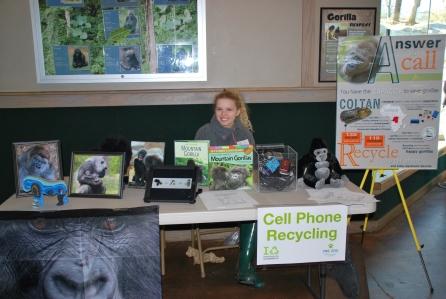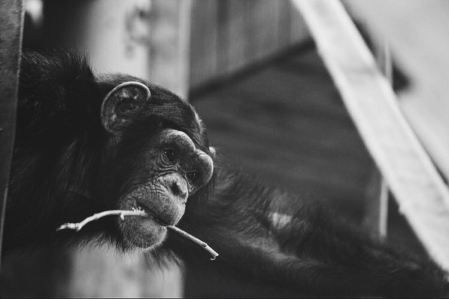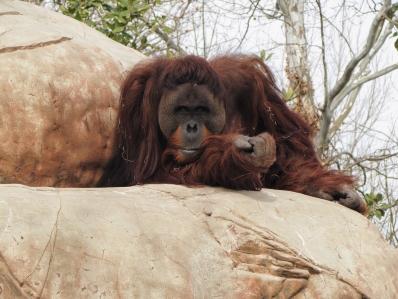Monkeying around
Senior Emily Stanford raises money for endangered apes.

Emily Stanford manages the Cell Phone Recycling table.
December 16, 2016
Senior Emily Stanford found her passion working among the species closest to humans. Great apes.
Stanford volunteers at the Oklahoma City Zoo as a junior curator.
As a junior curator, Stanford has the option of choosing which animals she wishes to work with at the Oklahoma City Zoo. She gets to go behind the scenes and help the keepers take care of the animals.
“I help with the diet preparation, the enrichment… I help with informing the guests about the animals,” Stanford said.
Stanford spends most of her time in the ape department. As she assists in their training, filming and observing their behavior, she developed a great love for the species.

A chimp reaches for an item.
“It is a bit different because the animals are so in tune with everything we do and things,” Stanford said.
The fascination started for Stanford in 2nd grade.
“I checked out a zoo book over old world monkeys and it kind of just sprung from there,” Stanford said. “As I’ve gotten older, my interests have become more narrowed because I have learned so much that is straight away from monkeys into great apes. I am very interested in their intellectual capacity.”
Stanford has been volunteering at the zoo for the past four years, putting in approximately 2,000 hours of her time. During this time, she worked all the way up to the point where she is able to interact with the apes.
Stanford has grown to love Orangutans because of one named Elok.

Elok poses for the camera.
“They’re my primary focus. We’ve had [Elok] for eight years now so I’ve grown up with him for the past eight years, watching him from the other side of the window and now I get to interact with him directly.”
Through mesh, Stanford and Elok play catch together and play other games.
“Before we give him anything, we have to sit and we’re like ‘What kind of evil could he do with this?’. We have to question everything we give to him because he’ll use it all for evil,” Stanford said.
At first, Stanford was strictly interested in chimpanzees but Elok changed that all for her.
“It’s really interesting to see how he gauges situations and what he chooses to do and he’s very personable and very charming and he just lures you in so he can do evil,” said Stanford.
The Oklahoma City Zoo partners with Eco-Cell.
Established in 2003, Eco-Cell created a recycling program that is also eco-friendly. The mission is to have people donate electronic devices in order to help preserve gorilla habitats in the wild.
“Tantalum — a metal found in your cell phones, your tablets, your chargers — is mined for in the Congo where the Eastern Lowland gorillas live. They’re the most endangered species of great ape in the world,” Stanford said.
Currently, there are 3,000 to 7,000 Eastern Lowland gorillas live in the world.
“There are not any in any zoos or any captive settings so by recycling your cell phones the mining in their habitats does not have to be increased,” Stanford said.
Stanford brought the Eco-Cell project to Harding where over 400 devices were raised.
“It’s crazy. Our school is so tiny,” Stanford said. “There’s only a little over 400 people here so it’s shocking. I’m really glad and thankful for it.”
The zoo accepts devices year round. They can be taken to guest relations at the zoo or Stanford herself.
Looking down the road, Stanford is positive she wants to continue working with apes. However, she is torn between choosing to study the psychological aspects of the apes and working to help improve the rehabilitation process as apes reenter the wild.
“There’s so much we do not know about what they’re capable of doing,” Stanford said.
Stanford wishes to spend her life in Indonesia and devote her time towards the research of apes.
“Ideally, I want to stay in state for my undergrad because I don’t know where I’m going to end up,” Stanford said.
She hopes to attend Emory University later for her Master’s and PhD.
“They’re pretty notorious for primatology and psychology.”

